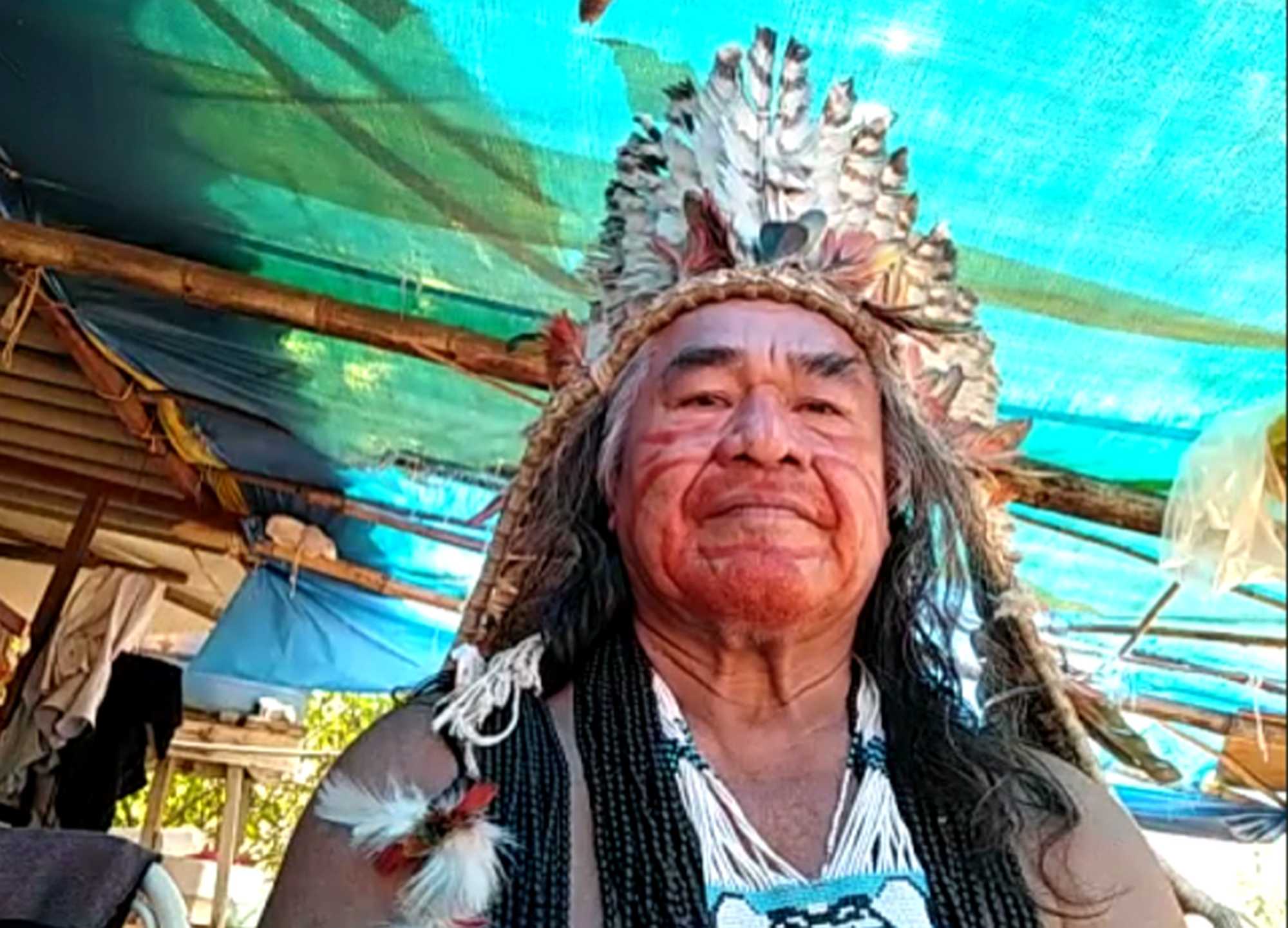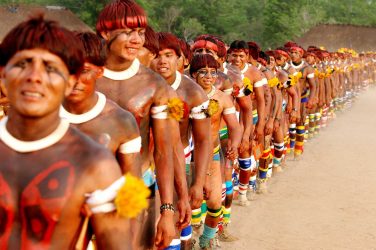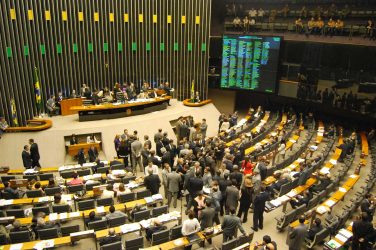Interview with indigenous chief Alvaro Tukano on the situation of indigenous peoples in Brazil and Covid-19
Álvaro Fernandes Sampaio Tukano is the chief of the 260,000 hectares Balaio Indian Reservation of the Tukano people on the upper Rio Negro in the state of Amazonas, Brazil. For decades, the 67-year-old defends the rights of the indigenous peoples, their territories and traditions.
Alvaro is considered one of the most important political leaders of Brazil’s indigenous peoples. In the 1970s he co-founded the indigenous movement in Brazil and in 1984 co-founded the umbrella organization of the Indigenous Organizations of the Amazon Basin (COICA).
How do you describe the situation of indigenous peoples in Brazil in general and today?
Álvaro Tukano: I would like to thank you for the opportunity to talk about the reality of the indigenous peoples and my people who live on the border between Brazil and Venezuela, in the municipality of São Gabriel da Cachoeira. My ceremony name is Doéthiro.
Doéthiro was the first man of my people called Yepa Mahsã. We are descendants of Doéthiro. Today I am 67 years and my father is 114 years old. He is one of the last survivors of the ancients, because most of them are gone and took a lot of traditional knowledge with them.
Generally speaking, Brazil has a history that is not pleasant for its indigenous peoples. We have lost peace since the day the “white man” entered our country. And our country was torn apart by the greed of the invaders. To date, we face prejudice and the Brazilian authorities are watering down our rights. The reality is that the “whites” have been robbing us since 1500, and they are still robbing us.
Such as the thousands of illegal gold miners in the Yanomami and Munduruku reservations…
Álvaro Tukano: The Brazilians know what the real situation is in this country. We are simply not taken into account. And because our rights are not respected and implemented by the government today, we find ourselves in an unfortunate situation with invaders like land robbers, timber companies, gold miners (garimpeiros) and a lack of justice and the murder of our leaders.
And all of this is done in the name of the development of Brazil and the exploitation of our resources for the world. It would be good if we were respected so that we would not be constantly manipulated in the name of progress. This is very bad for us.
And the Covid 19 pandemic has further worsened the situation of the indigenous population…
Álvaro Tukano: We are fed up with living in this world of injustice. And now the new corona virus was added. Without support, we lack the minimum conditions to face this pandemic.
Nevertheless, our wise healers with their traditional knowledge try to fight the disease. The majority of the indigenous people who had the coronavirus survived in my territory of the Tukano people. They escaped death with the help of shamanism and medicinal plants from the rainforest.
It is also a sad fact that COVID-19 has already hit a total of 140 Indian reservations and more than 620 indigenous people have died from the virus according to the Articulation of Indigenous Peoples of Brazil (APIB).
Álvaro Tukano: Mainly the indigenous people who were treated in non-indigenous public hospitals have died. They died because they did not believe in our traditional healing methods and medicines and because of the lack of traditional wisdom. The loss of traditional knowledge makes us dependent on the state healthcare system, and this system is expensive and not good.
Other native peoples such as the Xavante in Mato Grosso and the Kayapó in Pará have lost important leaders and chiefs because of the corona virus. A big loss was the legendary Paulinho Paiakan.
Álvaro Tukano: Unfortunately that’s the truth. We have lost the great Paulinho Paiakan, the defender of the indigenous peoples of the Amazon. He was a long-time colleague, a big star of the indigenous movement and the Kayapó people. In southern Brazil, we lost chief Nelson Xangrê, who was one of the first known leaders of the Kaingang and who also fought alongside me for the indigenous rights over the years. He also died of COVID-19.
Chiefs of the Xavante also died, and all because the indigenous world is becoming smaller and smaller due to the immense expansion of agribusiness. The agribusiness continues to advance with its pesticides and “roasts” the Cerrado, the Amazon and the rest of the country. The contamination happens day and night. Unfortunately we are facing this sad situation.
As a long time indigenous leader, what is your assessment of the previous government, the 14 years of PT, the Workers’ Party in power?
Álvaro Tukano: To touch that subject is to touch an open wound. I will touch the wound. As a leader for 30 years I took this banner of PT, the Workers’ Party, to many regions of the country. Despite being unemployed, we spoke as if we were factory workers, salaried men. I am not a wage earner, I am independent, like many indigenous people. However, it was good to dream about a better Brazil.
Unfortunately here in this country, the extremists on the right and the left, they are very quarrelsome, each defends his group, his dogma and forgets us, the indigenous peoples. So, I can’t say if that was a good time or that Lula was good. I cannot.
When that government of Lula da Silva was in power, it had the pen in its hand. But it was weak in the face of other programs that were of interest to large transcontinental companies such as hydroelectric power plants, dams, the transposition of the São Francisco River and other mega projects such as large football stadiums. And that was not in our interest.
Our interest was that the government demarcated and approved all indigenous territories – which did not happen. So it is really hard to say that it was good for us.
What is needed to improve the situation of the indigenous peoples of Brazil?
Álvaro Tukano: We need more resistance against the oppression we are suffering here in this country. These are, for example, the agricultural companies that threaten the future of Brazil and especially the future of the indigenous peoples.
International organizations also need to recognize where the real difficulties are. Many First World countries have given Brazil economic support to maintain and defend the Amazon and its peoples. This money is in the Brazilian development bank BNDES, more than a billion dollars. But this money does not reach the indigenous peoples who defend the Amazon day and night.
In November 1980, at the 4th Russell Tribunal in Rotterdam, I accused the Brazilian military dictatorship and the Salesian missionaries in the Amazon of ethnocide, which cost me dearly. Then in 1990, as a representative of COICA, I traveled through Europe to sign an agreement with European cities which should provide financial support for the defense of the Amazon rainforest.
You mean the Climate Alliance and the Manifesto of European Cities on an Alliance with Amazonian Indian Peoples, which is celebrating its 30th anniversary this year.
Álvaro Tukano: Yes. Since then, many NGOs have taken over the funds that were intended to protect the Amazon. Instead of benefiting the indigenous peoples, the money remained in the offices of the large NGOs – until today. Nothing came to us. That has to be said.
So it’s not just the Brazilian government that stands in the way. There are also people on the management levels of NGOs who hinder us, boycott and reject our projects. But we don’t really care. We will continue as we are.
We don’t want alms, sweets, glass beads or mirrors. It is respect that we want from the non-indigenous world, equality in dialogue and equality before the law. Brazilian society should support the indigenous peoples and respect our rights.
What else is necessary?
Álvaro Tukano: Brazil has 314 indigenous peoples who speak 272 languages. We are all together less than 1 million indigenous people in Brazil, we are survivors. There is Brazil’s state agency for indigenous affairs FUNAI, which basically has good employees to demarcate and protect our territories. But if FUNAI, like today, has no support from the government, this is bad for us. That is why we experience so many invasions by logging companies, gold miners and others.
What is your wish for the near future?
Álvaro Tukano: I would like to say to the young indigenous leaders in Brazil: we must never forget our origins and never be ashamed of our origins. We have to revive our traditions, maintain our ethics. And keep the simplicity that has always been the nobility of our chiefs, and don’t let anyone manipulate you.
This interview was conducted by Brazilian sociologist Márcia Gomes de Oliveira and journalist Norbert Suchanek from Rio de Janeiro.














